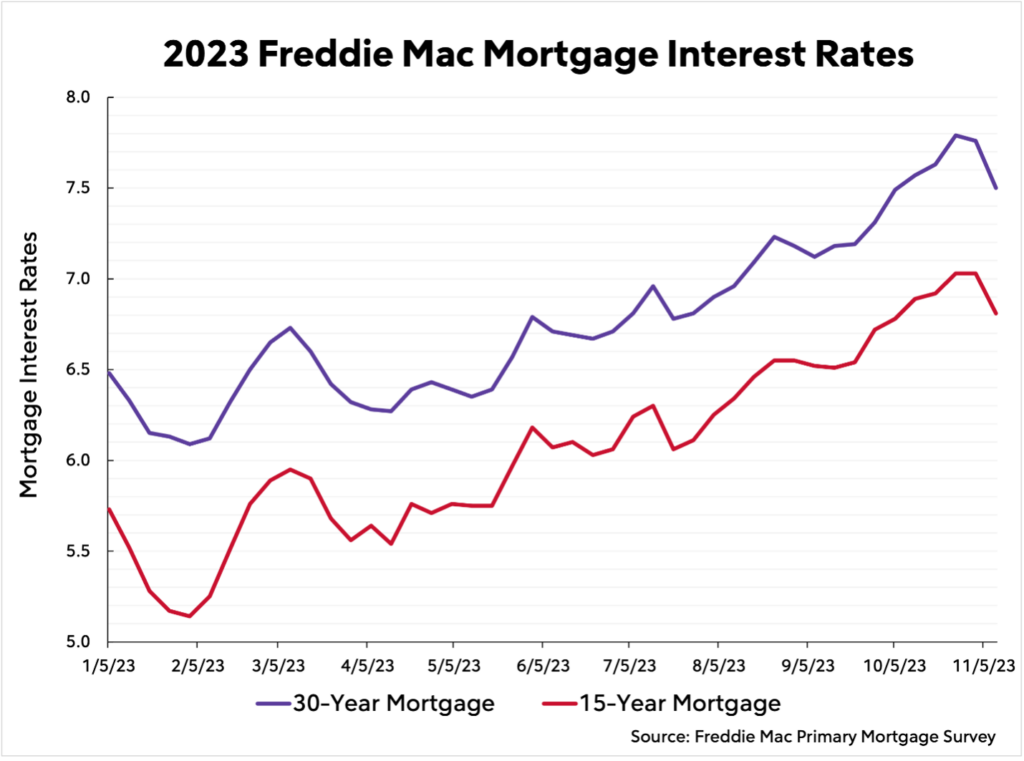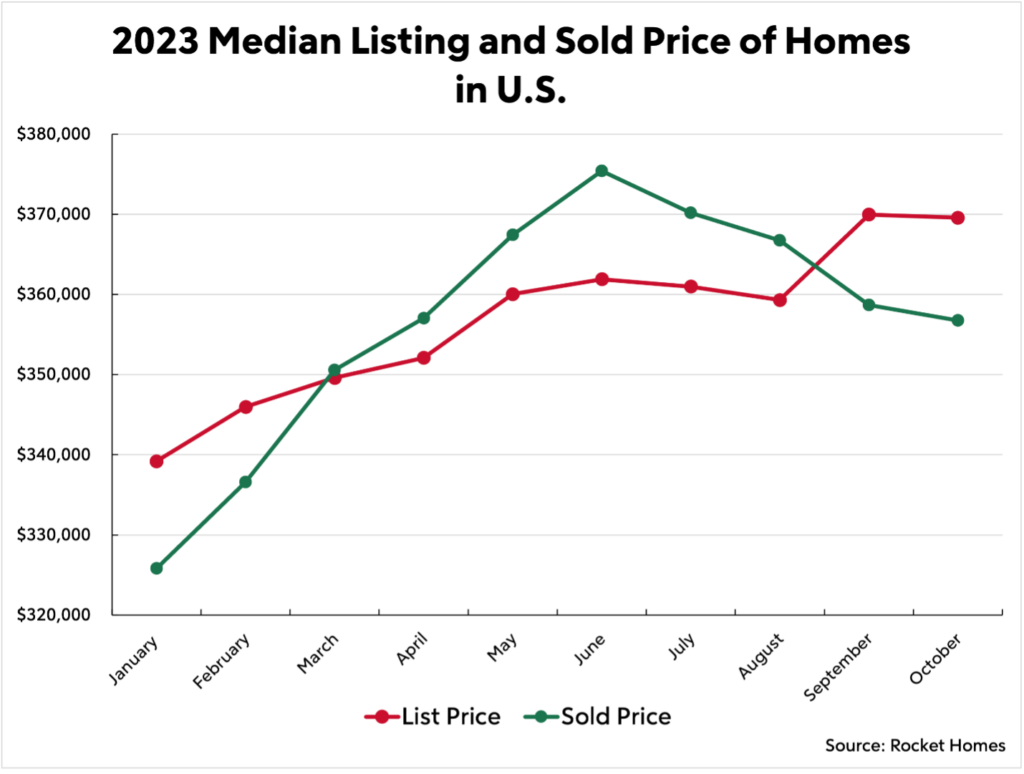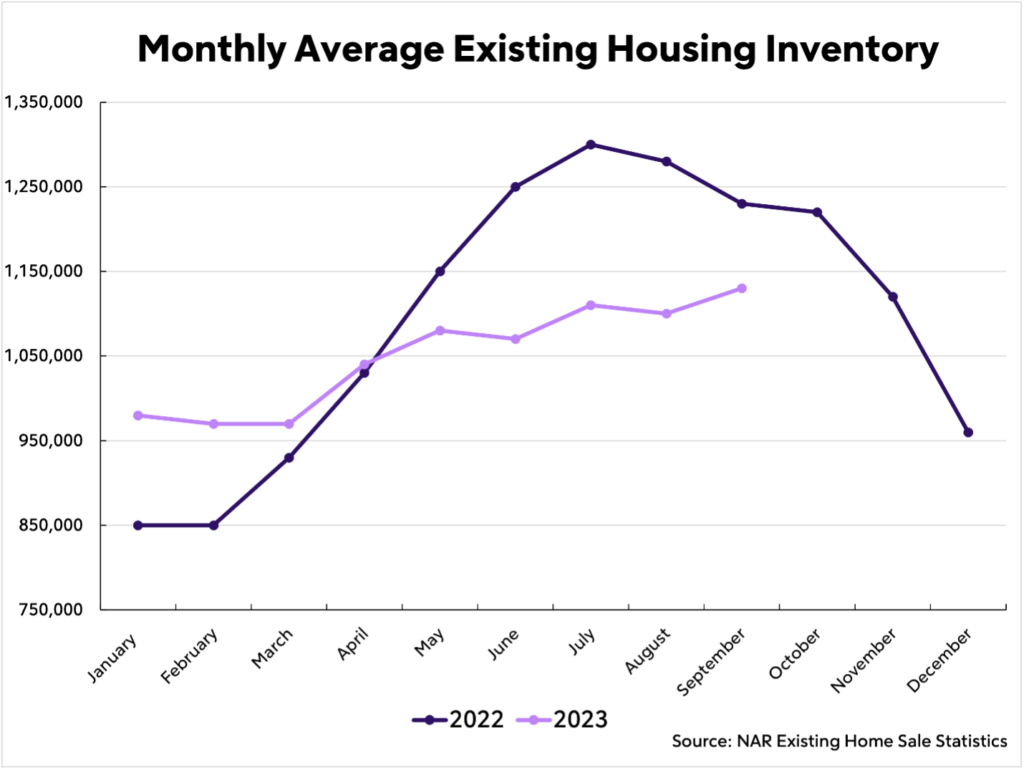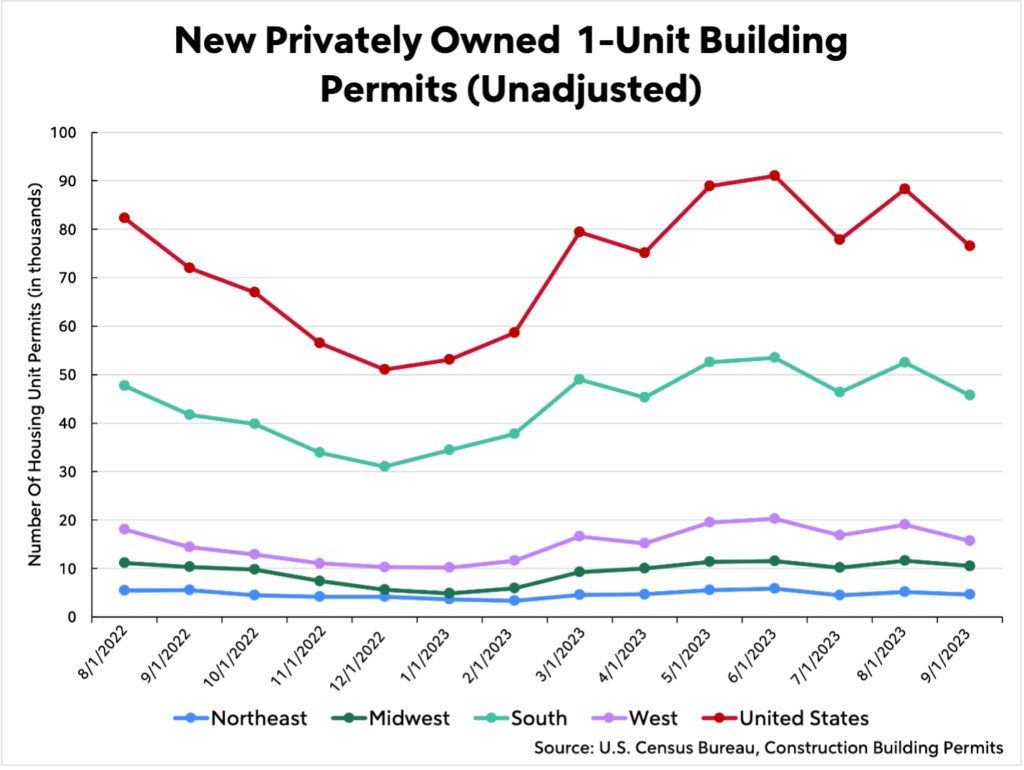2024 Housing Market Predictions

Author: Kevin Graham
- No one knows where mortgage rates are headed for sure, and the experts we talked to recommend not focusing on it.
- Expectations around both home prices and housing inventory vary wildly depending on where you are.
- Regardless of the market, home buyers and sellers need to determine for themselves whether it’s the right time to make a move based on their personal and financial situation.
In some ways, the housing market hasn’t changed much from 2022. In other ways, it has – though not as significantly as we’ve seen in the last few years. Median list price is up more than $12,000 over the first 10 months of 2023, while the median sale price is up more than $8,000 based on data from our friends at Rocket Homes℠.1 While sellers may be seeing these numbers as promising, those trying to buy a house may think otherwise.
So who is right? Data and real estate professionals may provide a glimpse. We gathered some housing market predictions from real estate agents across the country so those looking to buy or sell in 2024 have an idea of what to expect. Before we get there, though, let’s take a brief look at how 2023 shaped up.
2023 Real Estate Trends
The average rate on a 30-year fixed mortgage is up 0.7% since this time a year ago, now at 7.03% as of December 2023, according to Freddie Mac. Part of the reason for the mismatch between prices and interest rates probably comes down to inventory.
In 2022, total housing inventory between new and existing home sales was 5.674 million, based on data from the National Association of REALTORS® (NAR), the Department of Housing and Urban Development (HUD) and the Census Bureau.
Final numbers for 2023 aren’t in yet, but projections through September for 2023 have total inventory at 4.719 million. Less supply is available. For those looking for signs of relief, the good news is homes aren’t flying off the market like they once were. Data from Rocket Homes shows that in 2022, homes were on the market for an average of 36 days. Through October of 2023, that number is up to 45 days.
Housing Market Forecast For 2024
It’s important to note that even the closest follower of real estate trends doesn’t have the ability to glimpse the future. The following are speculations based on how Rocket Homes Partner Agents across the nation, from different housing markets, are advising their clients at the moment.
Thinking about these housing market factors, one may see they break down broadly into two categories: housing affordability and inventory. Of course, these are all interrelated because housing inventory affects home prices.
Mortgage Interest Rates
The reality is mortgage rates have been on a steady upward trajectory since the end of 2021 and that pattern has continued throughout 2023, as the graph below shows.

Interest rates and the federal funds rate are not directly correlated because mortgage rates are influenced by the yields of mortgage-backed securities (MBS) in the bond market. However, it’s fair to say that they both follow the same general direction.
The federal funds rate transaction is negotiated when banks borrow from each other overnight. However, the Federal Reserve (Fed) sets the target range for these interactions. Since March 2022, the range has gone up 11 times from near zero to 5.5% at the top end. Investors are somewhat split as to how the Fed will proceed moving into 2024.
The fact that the Fed has been selling off its portfolio of mortgage-backed securities built up during the pandemic has also impacted the market.
How are real estate agents advising their clients to think about mortgage rates, especially when they want to know when mortgage rates will drop? Some see opportunity in the current market.
“Buy now before the interest rate goes down,” said Elaine Sherp of BHHS PenFed TX Realty serving Frisco/Dallas, Texas. “When rates go down, you will be competing with a lot of buyers that have been waiting and there will be bidding wars at that time. You will be paying above list price and sellers will want an appraisal addendum that says the buyer will pay the difference between appraisal and contract price. Home values are still going up here. BUY NOW! Should rates go down, refi.”
Laura Mori is a REALTOR® at the Keyes Company in Miami-Dade County, Florida. She is encouraging her clients to think about buying now versus later as a math problem:
“Mortgage payments will probably be about the same if you buy a home now versus wait until next year,” she said. “For example, say you buy a $700,000 home and finance it with 20% down at a 7% interest rate. Your mortgage payments (excluding taxes and insurance) will be around $3,725 per month. That same house will likely go up in price by at least 7.4% a year from now. So, if you wait another year, the price of the home will then be at least $751,800. Moreover, financing the home with 20% down at an interest rate of 6%, you’d be looking at roughly $3,606 per month in mortgage payments. The difference in monthly payments isn’t too much. Plus, if interest rates do drop a bit next year, there will likely be more buyers in the market, which means increased competition among buyers if inventory stays low.”
For Jennifer Brown of BHHS PenFed Realty in San Antonio, Texas, it’s really about making sure her clients have the proper context.
“In the 1980s, my parents bought a house at 14% interest,” Brown said. “Back then, they would have thought 7% was fantastic! I also tell them that they can refinance if/when the rates come down, and to not pass on their dream home because of an interest rate.”
Home Prices
In recent years, the anecdotal evidence in the news media may have the public thinking every house being sold was selling in about a day for $10,000 over the asking price. It leaves one to wonder whether home prices will ever go down.
While that remained the case for many properties in 2023, the trend has reversed recently. It remains to be seen whether this is a seasonal fluctuation or something more permanent.

Rocket Homes data provides a deeper dive into the averages from January through September of 2023.
- 30.2% of homes sold over asking or list price.
- 22.5% of homes sold for the asking price.
- 47.2% of homes have sold under asking.
- The best month to be a seller was June, when the average home sold for 104% of the asking price.
- For buyers, the best month was January, when homes were selling for an average of 96% of the list price.
Real estate is a business of local markets, though. Prices are where people really begin to see the difference.
“Prices are stabilizing. However, due to low inventory, nice properties are still selling for top dollar (at or above list price),” said Danny DeAngelo with BHHS PenFed Realty covering Maryland and Washington, D.C.
In other areas, prices are more noticeably on the rise.
“I am not seeing a price drop in homes, especially in the northern corridor of Dallas and Collin County,” said Susie Grant of BHHS PenFed Realty, covering Frisco and Dallas. “I see prices continuing to rise due to the lack of inventory and the growth in our area.”
Ellen Frink of Northville, Michigan, has a different challenge. “I feel the sellers are in denial regarding the fact that the prices are dropping,” she said.
Ricardo Remis of The Keyes Company in Palm Beach, Florida, said he doesn’t see any major changes in prices happening for his market one way or the other in 2024.
However, it’s not always just about the house, but how the seller puts it up for sale.
“If the house is priced appropriately, has premier marketing and is prepped for the market, I have seen properties going over list and multiple-offer situations,” said Sheree Cooke in Denver. “On the other hand. If these factors are not done, properties have a higher risk to sit on the market for 30-plus days and [have the] price reduced.”
Since home value is the price someone is willing to pay for the home today, it changes all the time based on the market. While mortgage lenders judge home value based on appraised value, they are sometimes behind sale values in hot markets. The median sale price of a home so far this year was $357,862, according to Rocket Homes data.
The value of any home is going to depend on its features, condition and market trends at the time of the sale. Sellers should rely on their real estate agent to get an idea of how to price their home. Buyers are advised to always get a home appraisal, which is required if they are getting a mortgage to purchase it.
Housing Inventory
Housing inventory is important to understand because it provides insight into the housing market. If there is more supply than demand, it’s a buyer’s market and prices may drop. The opposite is true if there’s more demand. Nationally, inventory is down 3.7% in 2023 compared to January – August 2022 when looked at in terms of monthly averages, based on Rocket Homes figures.

The supply of homes is always measured as a number of months relative to the current pace of sales. In other words, if the supply of homes was 6 months, that means that at the current sales rate, there would be enough supply to sustain the market for 6 months if no other houses were listed.
There are two big sources of housing inventory: existing home sales and new construction. On the existing side, NAR data has shown that the amount of supply relative to the level of sales is consistently between 3 – 4 months in recent years. This low level of inventory means that home buyers are choosing from limited options and that has led to sales being down. Nationally, existing home sales are down 21.4% compared to the first 8 months of last year. Across all regions, they’re down:
- Northeast: down 24.6%
- Midwest: down 20.4%
- South: down 19.2%
- West: down 25.8%
There are also indications that home buyers are being choosier about the inventory that is available. Days on market nationwide has gone up to 45 days as of October 2023, from 36 at the beginning of the year.
Inventory may increase going into 2024 specifically because rates are up. With interest rates rapidly rising, more deals are falling through before getting to the closing table. The longer homes stay on the market as a result of this, the more inventory will rise, potentially also pushing prices down.
The other side of this is new housing inventory, and the best indicator here is building permits. Though there are always more permits pulled than homes actually completed, new homes are sold before, during and after construction. Therefore, permits are still a good measure to see trend lines.
The following chart takes a look at trends in the most popular type of housing – a one-unit single-family home.

In both existing and new-build inventory, real estate agents have widely varying opinions around what levels in 2024 will mean for their markets.
“If the 2024 market continues the same track as in 2023, with the increase in the interest rates and the prices of homes so high, I believe it becomes much harder for the buyer with low approval rates to purchase the home of their choice,” said Wanda Jenkins-Countee of BHHS PenFed Realty in southern Maryland. “With the inventory low, the bidding wars continue especially at lower priced homes because of the number of buyers desiring homes at the lower price.”
In New Castle, Delaware, Yasmin Bowman of BHHS PenFed Realty sees more bidding wars not helped by a lack of new supply.
“New-construction deliverables will remain challenged due to supply chain issues, increasing building costs and a shortage of builder labor and available land. And rising interest rates make it more expensive for developers to buy land.”
On the flip side, Lori Hogan of Coldwell Banker Realty in Buffalo, Minnesota, doesn’t see bidding wars continuing. “I am seeing days on market increase significantly. There is a price range where homes are selling quickly if they are in good condition, between $300,000 – $350,000.”
Finally, Julie Scott of Coldwell Banker Realty Orlando says that bidding wars should be ending in her area in 2024 given affordability challenges.
“People’s buying power is decreasing due to inflation,” Scott said. “From the people that I have started to work with this year, most either couldn’t get financing due to their debt-to-income ratio or previous debt that has affected them getting a loan. I see the market being flat for quite a while.”
Will The Housing Market Shift Into A Buyer’s Market?
Like everything else in real estate, whether someone is in a buyer’s market or seller’s market depends on where they live. That’s not to say there aren’t macro factors that can influence shifts nationwide. On one hand, it would be good for buyers if interest rates came down, but some sellers will probably also feel more empowered to ask for higher prices at that point.
The single biggest factor that is going to control the status of most markets is inventory. More inventory tends to be better for buyers while less inventory would favor sellers.
What Factors Will Help Stabilize The Housing Market?
Two big factors would stabilize the housing market overall. It’s a combination of more inventory coming online (whether through new or existing home sales) and rates moderating. Ideally, they would come down, but it would be a win if they stopped going up. It would probably take a macro economic shock to get down near the 3% range many grew used to in 2020 – 2021.
Interest rates alone aren’t the problem. It’s that we aren’t seeing the price drops we would normally see with higher rates because inventory is so low.
When Should You Buy A House In 2024?
A couple of the real estate agents we talked to touched on this, but home buyers should buy a house when they’re ready. They should focus more on the monthly payment and whether they can afford it than the actual rate. By staying in good financial shape, home buyers could refinance later when rates drop. They’ll drop eventually. It’s a cycle. In the meantime, here’s how they can be ready:
- Improve qualifying factors: One of the biggest things to do early on in the process is work to improve credit by doing things like paying down debt and making on-time payments. Potential buyers should also start putting money aside for a down payment. In general, the higher the credit score and down payment, the better the rate will be.
- Figure out a budget: A mortgage lender’s approval will set the top end of a budget based on the lender’s risk tolerance. However, that doesn’t necessarily mean it’s a payment the buyer is comfortable with. Buyers will want to sit down with a budget and figure out a house payment they can afford that doesn’t compromise other financial and lifestyle goals.
- Compare mortgage options: Buyers will want to figure out their best mortgage option when working with a lender. If they get a conventional loan, mortgage insurance comes off once they reach 20% equity. There are also FHA loans that are good for those with lower credit or those who need to qualify with a slightly higher monthly payment. If they’re a qualifying veteran, service member or surviving spouse, VA loans often offer the best deal for the military community.
- Secure mortgage preapproval: Having a strong mortgage approval backed by documentation like bank statements, W-2s and tax returns lets sellers and their real estate agents know that the buyer has the financial backing to stand behind their offer.
- Make a stronger offer: Beyond a preapproval, a buyer will want to consult with their real estate agent on the elements of a strong offer in their area. The amount of money the buyer offers is a big piece, but so is certainty and flexibility for the seller. Sometimes they may request that the buyer waive contingencies like an appraisal or inspection. In other cases, they may just want more time to move out of the house after closing. Every situation is different.
When Is A Good Time To Sell Your House?
The right time to sell a house is when the homeowner is ready. This means being ready for everything that comes with a move. Not only does the seller have to pack up and move their life, but they have to know where they’re going next.
It’s important to understand motivations for selling. There are markets where many people can sell their homes for a lot of money right now. But the question is whether a seller could find another home. If they’re taking on another mortgage and it’s been a while since they’ve refinanced, rates are probably higher than what they remember. Here are tips for selling:
- Work with an experienced real estate agent: Especially in difficult markets like many metros find themselves in, it’s important to work with a real estate agent who really understands the changing dynamics of the local market specific to the buyer’s area. Sellers should also make sure their agent completely aligns with their goals of the sale.
- Determine the home’s value: Although an official determination on the home’s value will probably be made by an appraiser, sellers want to know their home’s value so they can price fairly. A home priced as a good value for the money will have the best chance starting a bidding war, driving up the price. A good real estate agent will help with a comparative market analysis.
- Make necessary home repairs and upgrades: Of course, sellers want to put the best possible face on the house they’re selling. But if there are issues with the home that an appraiser determines could affect health and safety, these typically have to be fixed before any deal can close.
Real Estate Market Predictions: FAQs
Now that we’ve touched on predictions from real estate agents around the country and what they might mean for buyers and sellers, let’s close by answering a couple of questions.
Will home prices drop in 2024?
This depends heavily on not only conditions like interest rates, but also what’s happening in the local market. It’s not possible to give a blanket answer to this question, but we would advise closely following local trends and relying on a real estate agent.
Should your clients buy a house now or wait?
This comes down to whether the buyer is financially ready, and only they can know that for sure. The important thing to do is focus on the monthly payment, because refinancing is possible down the line as long as credit remains good. Those who wait may have time to save for a down payment and work on their credit.
The Bottom Line
Real estate trends in 2023 have been dominated by rising mortgage rates and stubbornly high home prices due to low housing inventory. It’s important to keep two things in mind: No one knows the future and real estate is local, so it’s hard to make sweeping predictions.
Ultimately, the choice to buy or sell a home now or in the new year should come down to whether the buyer or seller is personally ready to take the leap.
This article was originally posted on RocketMortgage.com.
1Rocket Homes® is a registered trademark licensed to Rocket Homes Real Estate LLC. The Rocket HomesSM Logo is a service mark licensed to Rocket Homes Real Estate LLC. Rocket Homes Real Estate LLC fully supports the principles of the Fair Housing Act. For Rocket Homes Real Estate LLC license numbers, visit RocketHomes.com/license-numbers. California DRE #01804478. Hawaii License # RB-23371. TREC: Information about brokerage services, Consumer protection notice.